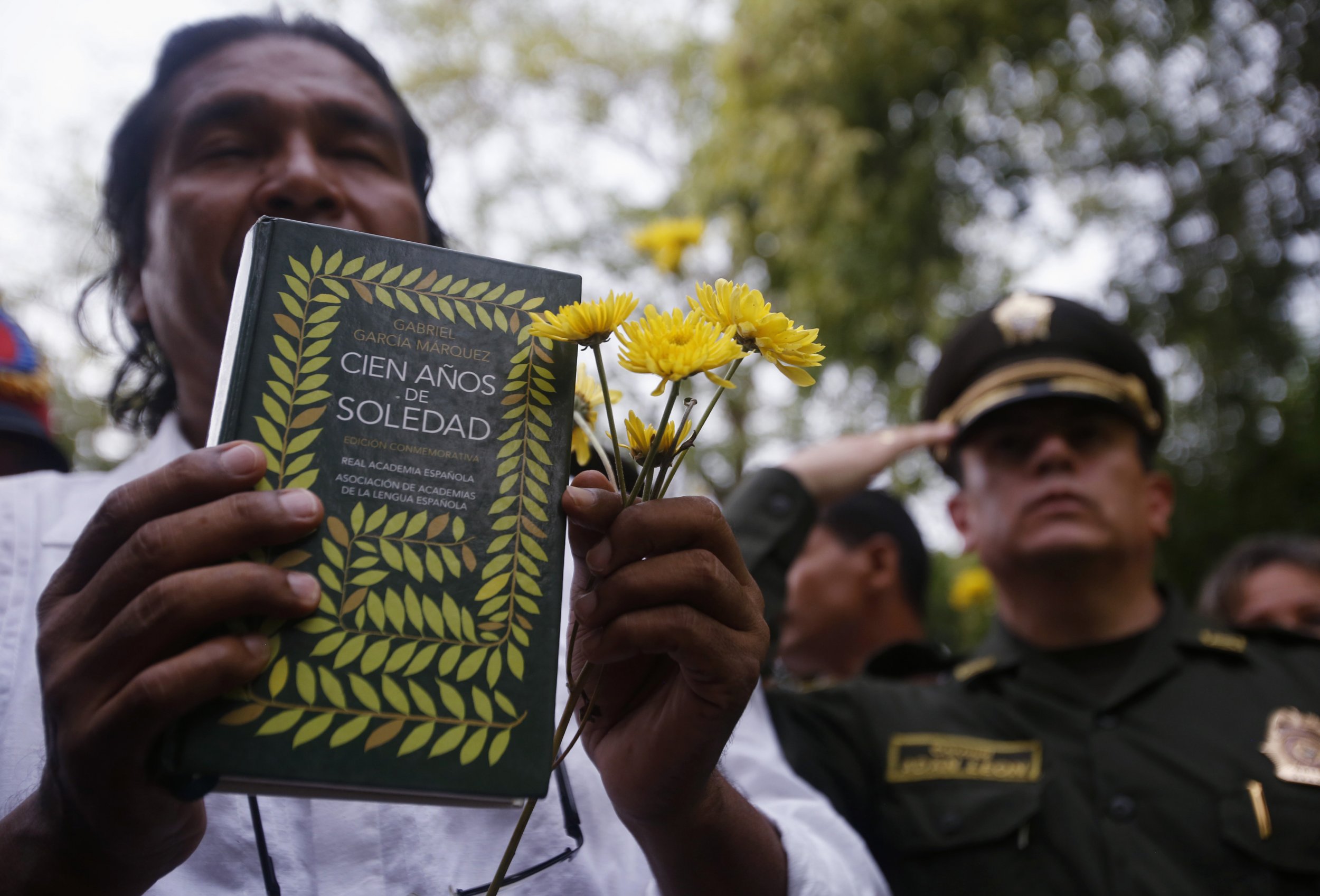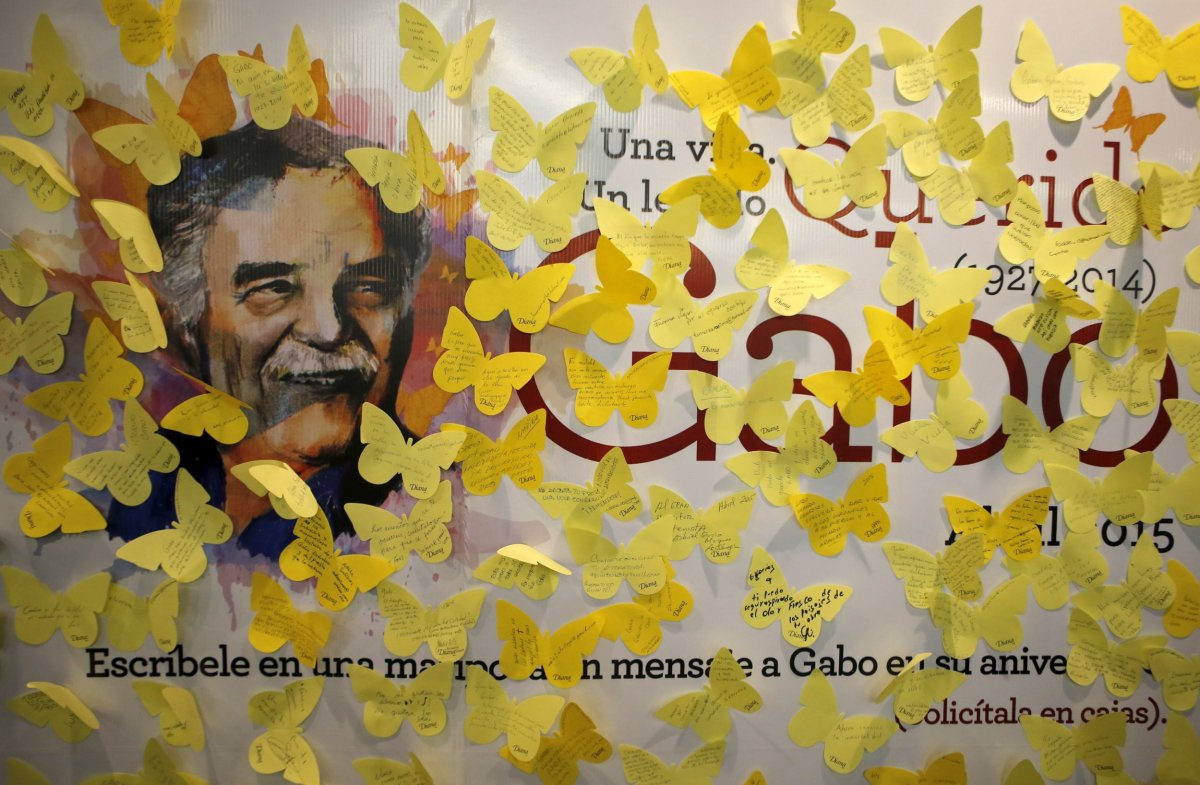
Few novels have received such warm praise from politicians, writers, critics and artists as One Hundred Years of Solitude did in the 50 years since its publication.
The family epic set in the fictitious Latin American village of Macondo touched lives across the globe, having sold around 50 million copies worldwide. The third most translated Spanish book according to the UNESCO, One Hundred Years of Solitude inspired a new literary genre, is regularly mentioned as a favorite book by politicians and celebrities and eventually won its author, Gabriel Garcia Marquez, a Nobel Prize for Literature in 1982.
Marquez's publisher, Editorial Sudamericana, ordered the printing of 8,000 copies that started selling on May 30, 1967 and quickly sold out.
"When my Spanish publisher told me he was going to print 8,000 copies I was stunned, because my other books had never sold more than 700," Marquez recalled in a 1981 interview with The Paris Review. "I asked him why not start slowly, but he said he was convinced that it was a good book and that all 8,000 copies would be sold between May and December. Actually they were all sold within one week in Buenos Aires."
1. The Popularization of Magic Realism
Intertwining elements of magic and folklore with historical descriptions of civil wars and massacres, Marquez's book became one of the shining examples of a new literary genre, magic realism.
In the Paris Review interview, Marquez said the modeled the novel's style on the stories his grandmother used to tell. "She told things that sounded supernatural and fantastic, but she told them with complete naturalness," Marquez said, further explaining the technique: "I discovered that what I had to do was believe in them myself and write them with the same expression with which my grandmother told them: with a brick face."
Along with the work of Argentine writer Jorge Luis Borges, Brazil's Machado de Assis and Mexico's Juan Rulfo, who were the earliest examples of magical realism, Marquez inspired generations of other novelists to add a touch of magic to their stories. In perhaps the most evident example of Marquez's influence, Isabel Allende, the niece of Chilean socialist leader Salvador Allende, included surreal elements to her novel The House of the Spirits, a family saga affected by civil war.
Peruvian writer Mario Vargas Llosa, with whom Marquez shared a somewhat troubled friendship, said One Hundred Years of Solitude was a quintessential Latin American novel. "This was the book that enlarged the Spanish-language reading public to include intellectuals and also ordinary readers because of its clear and transparent style," he told Vanity Fair. "At the same time, it was a very representative book: Latin America's civil wars, Latin America's inequalities, Latin America's imagination, Latin America's love of music, its color—all this was in a novel in which realism and fantasy were mixed in a perfect way."
2. Inspiration to Politicians
The book did not only make an impression on fellow artists and writers, but also on politicians even in the U.S., where Marquez was not allowed to travel for three decades due to his political views, which ran counter to American foreign policy the time, particularly in Cuba and Nicaragua.
"Exiled Colombian banned in U.S. wins Nobel" was the title of an article published on the American news wire UPI about Marquez winning the literary honor in 1982. The ban on Marquez would be lifted by one of his admirers, President Bill Clinton. Clinton would later say he had read One Hundred Years of Solitude in 1972 as a law student at Yale, and was so enthralled with the novel he was unable to put it down, even during classes.
When Marquez died in 2014, President Barack Obama praised him as "one of my favorites from the time I was young" and mentioning his cherished, inscribed copy of One Hundred Years of Solitude.
3. A Story That Crossed Borders
The novel received international acclaim, winning literary prizes across the world: Italy's Chianciano Award, France's Prix du Meilleur Livre Étranger, Venezuela's Rómulo Gallegos Prize, and the Books Abroad / Neustadt International Prize for Literature.
The cosmopolitan appeal of One Hundred Years of Solitude also inspired artists globally. Mexican singer Oscar Chavez, Italian folk-rock band Modena City Ramblers and American musician Owen were some of those who wrote songs inspired by the book.
In Japan, director Shuji Terayama adapted the novel to the realm of Japanese culture and history for his play One Hundred Years of Solitude and his film Farewell to the Ark.

4. An Unfortunate Reference
The fictitious town at the center of the events in the novel, Macondo, entered history for an unfortunate reason too.
Macondo was the name of the Mississippi Canyon Block 252 (MC252) the BP oil and gas prospect in the Gulf of Mexico, off the coast of Louisiana and the location of a leak in 2010 which led to one of the world's worst environmental disasters.
The unusual naming decision was taken by a BP employee who won that right as part of a United Way fundraiser. BP spokesman Daren Beaudo told Reuters at the time he did not know whether the name came from the Nobel Prize–winning author's novel.
5. The One Classic Without a Film Version
Despite the tremendous worldwide success, Marquez's novel was never re-created for the big screen. The writer was decisively against the idea of turning the novel into a film, as he was eager to protect the reader's powers of imagination. "I don't want it to become a film, since the film viewer sees a face that he may not have imagined," he told The Paris Review. "I have no interest in a film, and as long as I can prevent it from happening, it won't. I prefer that it remain a private relationship between the reader and the book.
Marquez said he instructed his agent to put up the film rights for $1 million to discourage offers, later raising the price tag to $3 million since the offers were approaching the initial mark.
Marquez reportedly joked to Hollywood producer Harvey Weinstein that he would grant him and Italian director Giuseppe Tornatore the rights, on one condition: "We must film the entire book, but only release one chapter—two minutes long—each year, for one hundred years," Weinstein recalled, as quoted in The Independent.
Uncommon Knowledge
Newsweek is committed to challenging conventional wisdom and finding connections in the search for common ground.
Newsweek is committed to challenging conventional wisdom and finding connections in the search for common ground.
About the writer
Sofia Lotto Persio reports mainly on Asia and gender issues for Newsweek. She previously covered international affairs with a specific ... Read more
To read how Newsweek uses AI as a newsroom tool, Click here.








